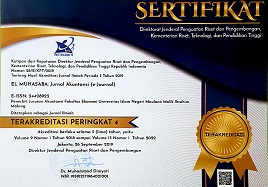PENGARUH RELIGIUSITAS DAN LOVE OF MONEY TERHADAP KEPATUHAN CALON WAJIB PAJAK
Abstract
The purpose of this study was to determine the effect of religiosity and Love of money on prospective taxpayer compliance. Population of this research was students at State Universities in Malang and the amount sample is 393 respondent that was obtained by using using purposive dan snowball sampling teqnique. The type of research is quantitative method using the associative causal method. Data coolestion is done by distributing questionnaries online and off line. The data analysis technique used in this study is multiple linear analysis. The results showed that the calculated value of t on the religiosity variable was 7,593, and the Love of money of 3,570 was greater than t table of 1,966. So religiosity and Love of money affect the compliance of prospective taxpayers. The variable that can explain the independent variable is 15.8%, and the remaining 84.2% is influenced by other variables not explained in this study.
Keywords
Full Text:
PDFReferences
Ariely, D. 2010. You are what you measure. Harvard Business Review, 88(6), 38.
Borkowski, S. C., & Ugras, Y. J. (1998). Business students and ethics: A meta-analysis. Journal of Business Ethics, 17(11), 1117-1127.
Gino, F., & Pierce, L. 2009. Dishonesty in the name of equity. Psychological Science.
James, S., dan Alley, C. 2000. Tax Compliance, Self-Assessment and Tax Administration. Journal of Finance and Management in Public Services, 2(2),27-42.
Kendra, C. (2009). Everything psychology book (2nd Edition): Retrieved from http://psychology.about.com/od/psychology101/u/psychology-theories.htm#s1.
Kirchler, E., Hoelzl, E., dan Wahl, I. 2008. Enforced versus Voluntary Tax Compliance: The "Slippery Slope" Framework. Journal of Economic Psychology, 29(2), 210-225.
Mohdali, Raihana and Pope, Jeff. 2012. The effects of religiosity and external environment on voluntary tax compliance. New Zealand Journal of Taxation Law and Policy 18: pp. 119-139
Roth, J. A., Scholz, J. T., dan Witte, A. D. 1989. Taxpayer Compliance, Volume 1: An Agenda for Research. Philadelphia: University of Pennsylvania Press.
Stack, S., dan Kposowa, A .2006. The Effect of Religiosity on Tax Fraud Acceptability: A Cross‐National Analysis. Journal for the Scientific Study of Religion, 45(3), 325-351.
Tang, T. L. P. (2010). Money, the meaning of money, management, spirituality, and religion. Journal of Management, Spirituality and Religion.
Tang, T. L. P. 2014. Theory of monetary intelligence: Money attitudes—religious values, making money, making ethical decisions, and making the grade. Journal of Business Ethics. doi:10.1007/s10551-014-2411-5.
Tang, T. L. P., & Chen, Y. J. 2008. Intelligence vs. wisdom: The love of money, Machiavellianism, and unethical behavior across college major and gender. Journal of Business Ethics.
Tittle, C. R., dan Welch, M. R. 1983. Religiosity and Deviance: Toward a Contingency Theory of Constraining Effects. Social Forces, 61(3), 653-682.
Torgler, B. 2003. To Evade Taxes or Not to Evade: That is the Question. Journal of Socio-Economics, 32(3), 283-302.
Welch, M. R., Xu, Y., Bjarnason, T., Petee, T., O'Donnell, P., dan Magro, P. 2005. But Everybody Does It: The Effects Of Perceptions, Moral Pressures, And Informal Sanctions On Tax Cheating. Sociological Spectrum, 25(1), 21-52.
DOI: https://doi.org/10.18860/em.v11i2.9117
Refbacks
- There are currently no refbacks.
Editorial Office:
Megawati Soekarnoputri Building
Accounting Department, Faculty of Economics
Jln. Gajayana 50 Telp (0341) 558881
E-mail: elmuhasaba@uin-malang.ac.id
Universitas Islam Negeri Maulana Malik Ibrahim Malang
E-ISSN 2442-8922
P-ISSN 2086-1249

This work is licensed under a CC BY SA 4.0 International License

















